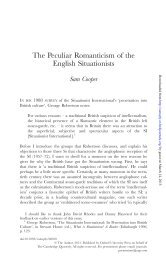The Sex of the Situationist International* - 1000 Little Hammers
The Sex of the Situationist International* - 1000 Little Hammers
The Sex of the Situationist International* - 1000 Little Hammers
You also want an ePaper? Increase the reach of your titles
YUMPU automatically turns print PDFs into web optimized ePapers that Google loves.
<strong>The</strong> <strong>Sex</strong> <strong>of</strong> <strong>the</strong> <strong>Situationist</strong> International 35<br />
subjects as well. Ins<strong>of</strong>ar as <strong>the</strong>y were consuming desire, not exercising it, ins<strong>of</strong>ar as<br />
<strong>the</strong>y were relinquishing responsibility for <strong>the</strong>ir desire to capitalist society, <strong>the</strong>y<br />
were quickly losing purchase on <strong>the</strong>ir agency. As Debord wrote in <strong>The</strong> Society <strong>of</strong> <strong>the</strong><br />
Spectacle, <strong>the</strong> “spectator’s alienation from and submission to <strong>the</strong> contemplated<br />
object (<strong>the</strong> result <strong>of</strong> his unthinking activity) works like this: <strong>the</strong> more he contemplates,<br />
<strong>the</strong> less he lives; <strong>the</strong> more readily he recognizes his own needs in <strong>the</strong><br />
images <strong>of</strong> need proposed by <strong>the</strong> dominant system, <strong>the</strong> less he understands his own<br />
existence and his own desires.” 23<br />
Despite <strong>the</strong> proliferation <strong>of</strong> bankrupt pleasures, <strong>the</strong> SI insisted that<br />
au<strong>the</strong>ntic desire was still possible. In order for a desire to qualify as au<strong>the</strong>ntic,<br />
though, it had to be self-identical with <strong>the</strong> individual giving expression to it.<br />
Au<strong>the</strong>ntic desires were essentially internal desires externalized by thinking subjects.<br />
Fur<strong>the</strong>rmore, it was only by establishing synchronicity with <strong>the</strong>ir desires<br />
and realizing <strong>the</strong>se desires in <strong>the</strong> world that individuals could attain <strong>the</strong> status<br />
<strong>of</strong> affective subjects. 24 As <strong>the</strong>orized by <strong>the</strong> <strong>Situationist</strong>s, <strong>the</strong>n, subjectivity was<br />
constitutive <strong>of</strong> desire to <strong>the</strong> extent that desire was constitutive <strong>of</strong> subjectivity.<br />
Debord went even far<strong>the</strong>r than this, asserting that <strong>the</strong> actualization <strong>of</strong> desire<br />
and subjectivity exists in dialectical relationship with <strong>the</strong> revolutionary transformation<br />
<strong>of</strong> <strong>the</strong> material conditions <strong>of</strong> everyday life. “Consciousness <strong>of</strong> desire and<br />
<strong>the</strong> desire for consciousness toge<strong>the</strong>r and indissolubly constitute that project<br />
which in its negative form has as its goal <strong>the</strong> abolition <strong>of</strong> classes and <strong>the</strong> direct<br />
possession by <strong>the</strong> workers <strong>of</strong> every aspect <strong>of</strong> <strong>the</strong>ir activity. <strong>The</strong> opposite <strong>of</strong> this<br />
project is <strong>the</strong> society <strong>of</strong> <strong>the</strong> spectacle.” 25<br />
Debord’s position on desire (and by extension that <strong>of</strong> <strong>the</strong> SI) seems to owe a<br />
23. Guy Debord, <strong>The</strong> Society <strong>of</strong> <strong>the</strong> Spectacle, trans. Donald Nicholson-Smith (New York: Zone Books,<br />
1994), p. 23.<br />
24. This raises ano<strong>the</strong>r important issue: <strong>the</strong> <strong>Situationist</strong> definition <strong>of</strong> “subject” or “subjectivity.” Debord<br />
posits <strong>the</strong> subject as an agent—that is, as one who is master <strong>of</strong> his own sovereign will (or his own sovereign<br />
desires, as <strong>the</strong> case may be). Debord devoted an entire chapter to this topic in “<strong>The</strong> Proletariat as Subject<br />
and Representation” in <strong>The</strong> Society <strong>of</strong> <strong>the</strong> Spectacle. Here he contrasts <strong>the</strong> worker as he is represented to himself<br />
by o<strong>the</strong>rs (whe<strong>the</strong>r <strong>the</strong> union or <strong>the</strong> government) with <strong>the</strong> worker as he assumes <strong>the</strong> status <strong>of</strong> subject.<br />
In allowing o<strong>the</strong>rs to speak on his behalf, Debord argues, <strong>the</strong> worker forfeits his autonomy and authority,<br />
<strong>the</strong>reby perpetuating his alienation. <strong>The</strong> worker as subject, on <strong>the</strong> o<strong>the</strong>r hand, exists in a dialectical relationship<br />
with his social, political, and economic liberation. According to Debord, <strong>the</strong> worker-subject<br />
secures his liberation, while liberation produces <strong>the</strong> worker-subject (pp. 34, 59–60). It is in <strong>the</strong> context <strong>of</strong><br />
this discussion that Debord provides as clear a definition <strong>of</strong> <strong>the</strong> subject as he was inclined to give: “As for<br />
<strong>the</strong> subject <strong>of</strong> history, it can only be <strong>the</strong> self-production <strong>of</strong> <strong>the</strong> living: <strong>the</strong> living becoming master and<br />
possessor <strong>of</strong> its world—that is, <strong>of</strong> history—and coming to exist as consciousness <strong>of</strong> its own activity” (p. 48).<br />
This might suggest that Debord, like Karl Marx before him, as Paul Smith has argued, presumes a<br />
quasi-mythical, post-revolutionary “subject” (or “concrete individual,” in Marx’s case) who is immune to<br />
both ideology and alienation. See Paul Smith, Discerning <strong>the</strong> Subject (Minneapolis: University <strong>of</strong> Minnesota<br />
Press, 1988), pp. 7–8. However, Debord and his <strong>Situationist</strong> comrades recognized that post-revolutionary<br />
subjects do not appear ex nihilo, but must be coaxed into being and, later, provided with <strong>the</strong> infrastructure<br />
to reproduce <strong>the</strong>mselves as subjects. (<strong>The</strong>se were some <strong>of</strong> <strong>the</strong> tasks with which <strong>Situationist</strong> art, architecture,<br />
and <strong>the</strong>ory were entrusted.) <strong>The</strong> SI might have conceived <strong>of</strong> post-revolutionary society as one<br />
from which alienation had been eradicated, in o<strong>the</strong>r words, but it never dismissed <strong>the</strong> determining force<br />
<strong>of</strong> social, cultural, political, and economic circumstance on subjectivity.<br />
25. Debord, <strong>The</strong> Society <strong>of</strong> <strong>the</strong> Spectacle, p. 34.



